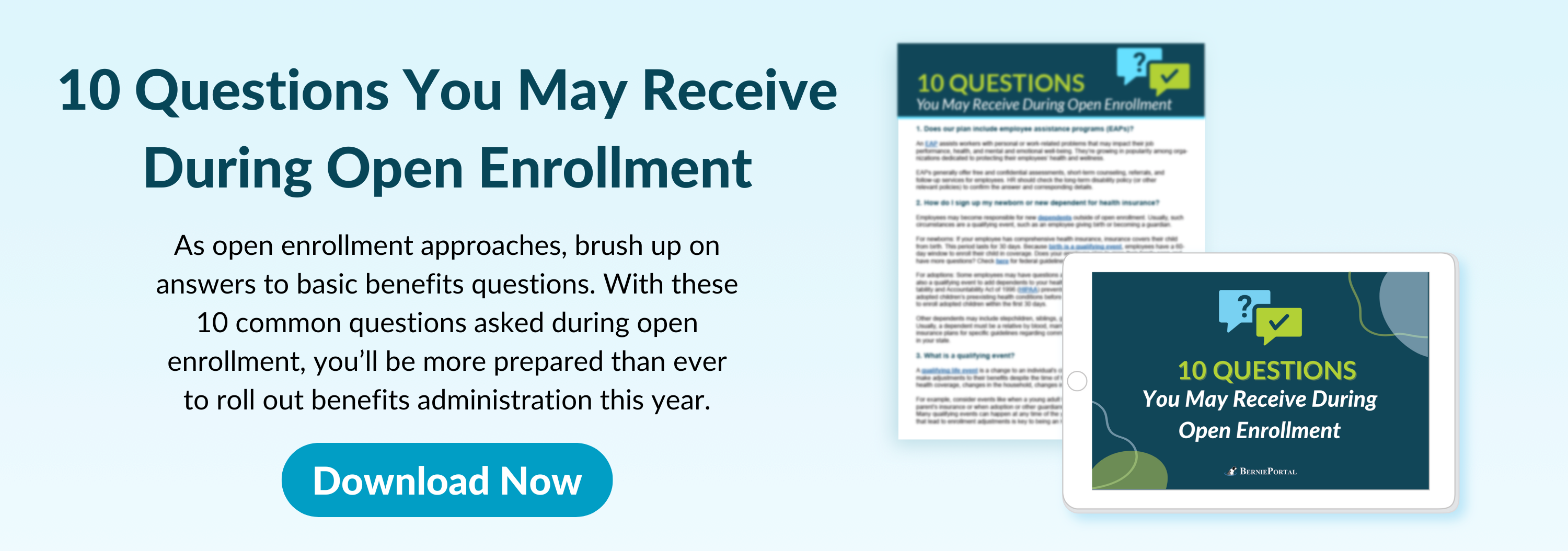Written by
Will Miranne
Will is an aPHR-certified writer on the marketing team at BerniePortal. He writes about healthcare, human resources, and benefits.
FAQ: Answering Your Top 10 Questions About HSAs

HSAs have become increasingly popular over the last decade, and for good reason. They are an excellent investment tool that can be used to pay for health expenses both now and in the future. The funds also never expire and can even be invested.
But like anything, there are always questions about how a benefit works and HSAs are no exception. Here is a list of the 10 most commonly asked questions regarding HSAs, that you can use to determine whether or not an HSA is the right healthcare investment tool for you and your employees.
→See how BerniePortal can help administer your HSAs with online open enrollment! Click here now for a free demo!
1. What is an HSA?
A Health Savings Account (HSA) is a personal bank account that allows employees to set aside pre-tax dollars for qualified medical expenses. HSAs must be paired with eligible high-deductible health plans (HDHPs). It will enable individuals to save on a pre-tax or tax-deductible basis to pay for qualified medical expenses.
HSAs are unique because the funds can be used to pay for various medical expenses. These include doctor visits, prescriptions, and many medications and medical devices. An HSA account is owned by the individual, and all funds roll over each year, setting it apart from an FSA and fortifying it as an excellent long-term savings tool for healthcare expenses.
2. How does an HSA work?
HSAs are offered as a part of a high-deductible health plan (HDHP), a health insurance plan with a high deductible. Individuals can contribute money to their HSA on a pre-tax or tax-deductible basis, and the funds can be withdrawn tax-free when used to pay for qualified medical expenses. The money in an HSA can also be invested, which can help the account grow over time.
Unlike a Flexible Spending Account (FSA), the funds in an HSA roll over from year to year, and the account is portable, meaning it stays with the individual even if they change jobs or insurance plans.
3. Who is eligible to open an HSA?
To be eligible to open an HSA, individuals must have a qualifying high-deductible health plan. For 2023, the IRS defines a high-deductible health plan as a plan with a deductible of at least $1,500 for an individual, an increase from $1,400 in 2022, or $3,000 for a family, an increase from $2800 in 2022.
The plan must also have an out-of-pocket maximum of no more than $7,500 for an individual or $15,000 for a family. Individuals must also not be enrolled in Medicare or claimed as a dependent on someone else's tax return. 4. What are the benefits of having an HSA?
A primary benefit of owning an HSA is the tax advantages that it provides. Contributions to an HSA are tax-deductible—they are made on a pre-tax basis, and withdrawals for qualified medical expenses are tax-free.
HSAs also provide individuals with more control over their healthcare spending, as they can use the funds to pay for various medical expenses. Finally, an HSA is portable, meaning it stays with the individual even if they change jobs or insurance plans.
5. How Much Can I Contribute to an HSA?
For 2023, individuals can contribute up to $3,850 to an HSA, and families can contribute up to $7,750. Individuals aged 55 or older can contribute an additional $1,000 per year as a catch-up contribution. It's important to note that contributions to an HSA must be made by the tax filing deadline, usually April 15th of the following year.
6. What are the tax implications of having an HSA?
Contributions to an HSA are tax-deductible or made on a pre-tax basis, which can reduce an individual's taxable income. HSAs are unique in that they provide three different tax benefits. If you have ever heard the term “triple tax advantage” when discussing HSAs, it refers to these benefits.
Here is a breakdown of each of the three tax advantages:
1. Tax-free contributions:
Tax-free contributions mean that the money you place into your HSA is not taxed. Another way of saying this is all money contributed to an HSA is “pretax” money.
As an example, let's say you set aside $4,000 each year to pay for any medical expenses. After paying 22% federal taxes on that amount, you now have only $3,120 to use for those medical expenses.
If you were to invest that same amount into an HSA, the amount you would have to spend on medical expenses would be exactly $4,000. This is the first major benefit of an HSA.
2. Tax-free earnings:
This benefit is exactly how it sounds. Any growth or earnings on an HSA account accrue tax-free. This means that you can grow your account and further increase your spending amount on medical expenses.
3. Tax-free withdrawals:
With traditional tax-advantaged accounts like IRAs or 401(k)s, you will pay taxes whenever the money is withdrawn, save for a Roth account, in which case you will pay taxes on the money ahead of time. With an HSA, you will not pay any taxes when withdrawing funds to pay for qualified medical expenses.
Funds withdrawn for non-qualified expenses before age 65 will be subject to income tax and a 20% penalty. After age 65, withdrawals for non-qualified expenses are subject to income tax but not the penalty.
7. Can I invest the funds in my HSA?
Yes, individuals can invest the funds in their HSA, similar to an IRA. While using HSAs for healthcare expenses is valuable, maximizing contributions and investing funds can be the most effective way to benefit from the accounts since the funds are rolled over year after year and can be used indefinitely.
The available investment options will typically depend on the HSA provider, but some common options include mutual funds, stocks, and bonds. Investing the funds in an HSA can help the account grow over time and provide more funds for healthcare expenses in the future.
It's important to note that investing the funds in an HSA carries some risk, as with any investment. It's essential to carefully consider your options, financial position, and the potential risks of the portfolio before making any decisions to invest.
8. What expenses can I pay using HSA funds?
HSA funds can be used to pay for many qualified medical expenses, including deductibles, copays, prescriptions, and medical devices. Several less common expenses may include acupuncture, chiropractic care, and mental health services.
Not all medical expenses, however, are eligible for HSA funds, and it's the individual's responsibility to ensure that expenses are qualified before using HSA funds to pay for them.
9. Do HSA funds expire?
No, HSA funds do not expire. Unlike FSAs, which typically have a "use it or lose it" policy, the funds in an HSA roll over from year to year. This makes HSAs fantastic long-term savings tools.
10. Can I use my HSA funds for my spouse or dependents?
Yes! You can use your HSA funds to pay for qualified medical expenses for the account holder, spouse, and dependents. But If the account holder has a family HDHP, they can only contribute up to the family contribution limit, regardless of how many family members are covered under the plan.
If the account holder is divorced or separated, they may need to provide documentation to show that their ex-spouse or dependent is eligible for HSA funds.
If your spouse is enrolled in a general-purpose FSA plan, you are not considered eligible for an HSA alongside it. The reasoning is that both the FSA and the HSA will reimburse expenses before the deductible is met. Expenses would be covered under both plans and, as such, disqualify one another. This is true even if the employee does not qualify as a dependent on their spouse's plan.
However, If the spouse is enrolled in a post-deductible plan or a limited-purpose plan, then as mentioned previously, they will still be considered eligible for an HSA. This means that even if you are not considered a dependent, you will still qualify for an HSA plan alongside your spouse's FSA.
Additional Resources
You can also stay informed, educated, and up-to-date with all things HR by using BerniePortal’s comprehensive resources:
- BernieU—free online HR courses, approved for SHRM and HRCI recertification credit
- BerniePortal Blog—a one-stop-shop for HR industry news
- HR Glossary—featuring the most common HR terms, acronyms, and compliance
- HR Guides—essential pillars covering an extensive list of comprehensive HR topics
- HR Party of One—our popular YouTube series and podcast, covering emerging HR trends and enduring HR topics
Written by
Will Miranne
Will is an aPHR-certified writer on the marketing team at BerniePortal. He writes about healthcare, human resources, and benefits.
Related Posts
FMLA, or the Family and Medical Leave Act, is a federal law that allows qualified...
FSAs and HSAs can get tricky within a family. While HR should never provide employees...
Yes, you can use a health savings account, or HSA, for cosmetic surgery, but only in...
If you work at an SMB without mental health support resources, you may feel limited in...








Submit a Comment